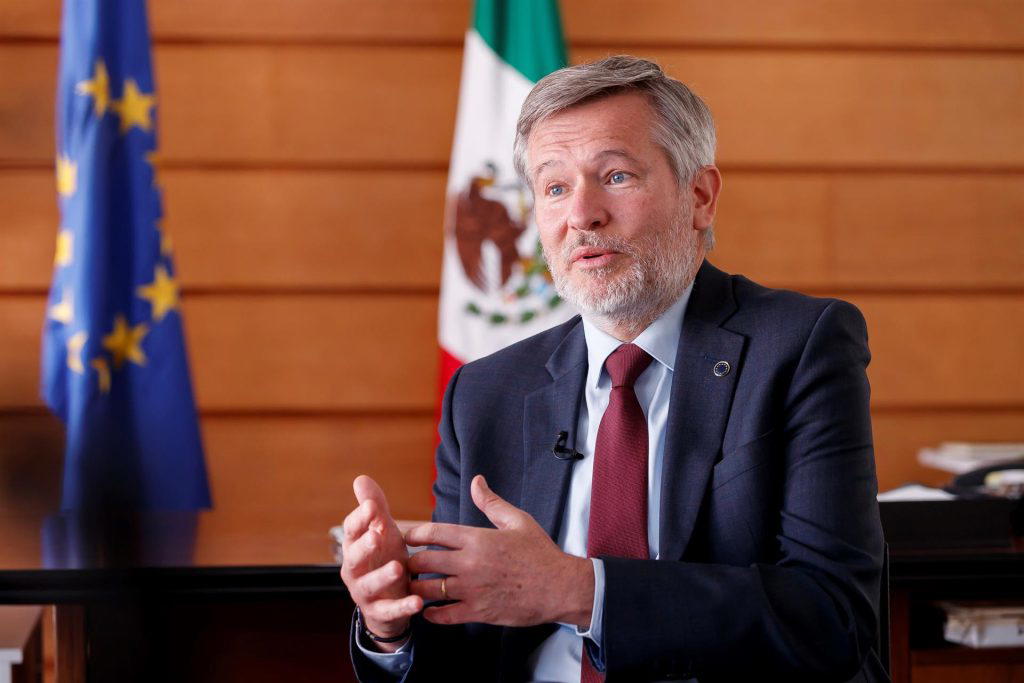
By Joseph Erunke
The second phase of RESILAC 2, a five-year co-funded initiative of the European European EU and Agence Française de Dévelopement, AFD, has been launched to boost the economic and social recovery of the Lake Chad Region.
The project, launched in Abuja on Thursday, aims to empower resilience in the Lake Chad region, particularly in Nigeria. It is expected to impact half a million vulnerable persons.
The project’s launch signifies an essential step in boosting community resilience and promoting sustainable livelihoods in the Lake Chad region, especially in conflict areas.
The RESILAC 2 project, implemented by Action Against Hunger, ACF, Care and other partners, seeks to enhance access to basic services, foster economic recovery, and promote social cohesion among displaced populations, refugees, and host communities.
Speaking at the project launch, Gautier Mignot, EU Ambassador to Nigeria and ECOWAS, described the project, which is being carried out in partnership with the Lake Chad Basin Commission, LCBC, as very important.
Noting that the EU and the Agence Française de Development developed the project over the years in the Lake Chad area, Amb. Mignot disclosed that the project would be financed with 40 million Euros.
“This is a new phase with 40 million Euros of financing from the European Union and the Agence Française de Développement. This is a project about helping the communities and especially the most vulnerable, particularly the IDPs, to have better livelihood opportunities and employment in sectors like forestry, fisheries, agriculture and others. It will also strengthen local authorities, local NGOs, and civil society organisations. And we also have a batch of firm implementing partners in the benefiting countries.
“Here in Nigeria, it will benefit three local government areas of Borno State and other communities. In Cameroon, northern Cameroon will benefit and also in the Lake Province of Chad”, he said.
According to him, RESILAC “lies between continuity and innovation, consolidating lessons learned and best practices of phase one, but scaling up actions undertaken, adjusting the project approach to make it more holistic, sub-regional, partner-centred, with new target groups and new thematic areas, also consolidating the nexus between humanity and action and development cooperation.”
He described RESILAC as “a multilevel community, communal, regional, national, and sub-regional project.”
He added:” It’s also a multi-sector project with three main interconnected and complementary action areas. It’s a multi-donor project with the European Union and the Agence Française de Développement, the French Republic, joining forces with a total budget of 40 million Euros, illustrating a very strong Team Europe approach that we are developing now in the framework of a global gateway strategy,” he added.
“And we have a protocol of cooperation, which has been developed to provide a framework for this cooperation, and key partnership areas are identified in terms of synergy of actions, exchange of experience and expertise, and capacity building. So, the general objective of RESILAC is to strengthen people’s resilience, but it’s essential to explain what lies behind this concept, a word that has become prevalent in development cooperation. It’s about strengthening access to basic services, livelihoods, and social inclusion opportunities.
Also speaking, the Executive Secretary of the Lake Chad Basin Commission, Ambassador Mamman Nuhu, explained that RESILAC directly addresses the Commission’s Regional Stabilization Strategy, “which we have been implementing for the past six years.”
He described RESILAC as a strategy for restoring livelihoods in areas affected by the Boko Haram insurgency.
“So the entire activity of RESILAC speaks directly to some of the strategies that we have within that Regional Stabilization Strategy. It is very important,” he emphasised
Speaking on how the project would revive Lake Chad, Nuhu said the lake is no longer drying up, unlike in the past.
“I’m glad to tell you that Lake Chad is no longer drying up. Lake Chad dried up, first of all, between 1972 to 1975. The waters of the lake went down by 50 per cent. Then, between 1982 and 1985 also, we had another bout of drought, which caused the lake to lose about 94 per cent of its water.
“But since 1985, the waters have been picking up. And they are still picking up. Two years ago, we had 16,000 square kilometres of water. So the crisis of drying up of the lake is no longer a problem,” he said.
In a keynote address, the Country Director of Action Against Hunger, represented by the Deputy Country Director, Andualem Fekadu, explained that the first phase of the program, implemented from 2018 to 2022, achieved commendable progress in restoring livelihoods, fostering social cohesion, and strengthening local governance structures.
“ Yet, despite these gains, the reality of the ground continues to evolve, necessitating a new, adaptive, and innovative response for a long-term environment,” he said.
The Minister of Budget and Economic Planning, Abubakar Atiku Bakudu, speaking through his representative and Permanent Secretary in the ministry, Vitalis Emeka Obi, said the federal government welcome the second phase of the project as “an opportunity to deepen our cooperation and to ensure that efforts on the ground contribute directly to the goals of the Regional Stabilization Strategy and of the member states of the Lake Chad Basin Commission. “
“More particularly, we commend the inclusive and multi-actor approach adopted by RESILAC 2, bringing together local CSOs, NGOs, research institutions, and regional platforms.
“This diverse consortium reflects the spirit of complementarity and mutual learning we wish to promote in the region.
“As we move forward, several strategic priorities must guide our collective action. We should be able to anticipate and adapt to the growing risks of climate-induced disasters,” he said.
Highlighting the project’s importance, the minister noted that the day marked “a pivotal moment as we come together to reinforce our shared commitment to fostering development and humanitarian aid in the Lake Chad region.”
The post EU, AFD launch N70bn project to boost economic, social recovery of Lake Chad appeared first on Vanguard News.








